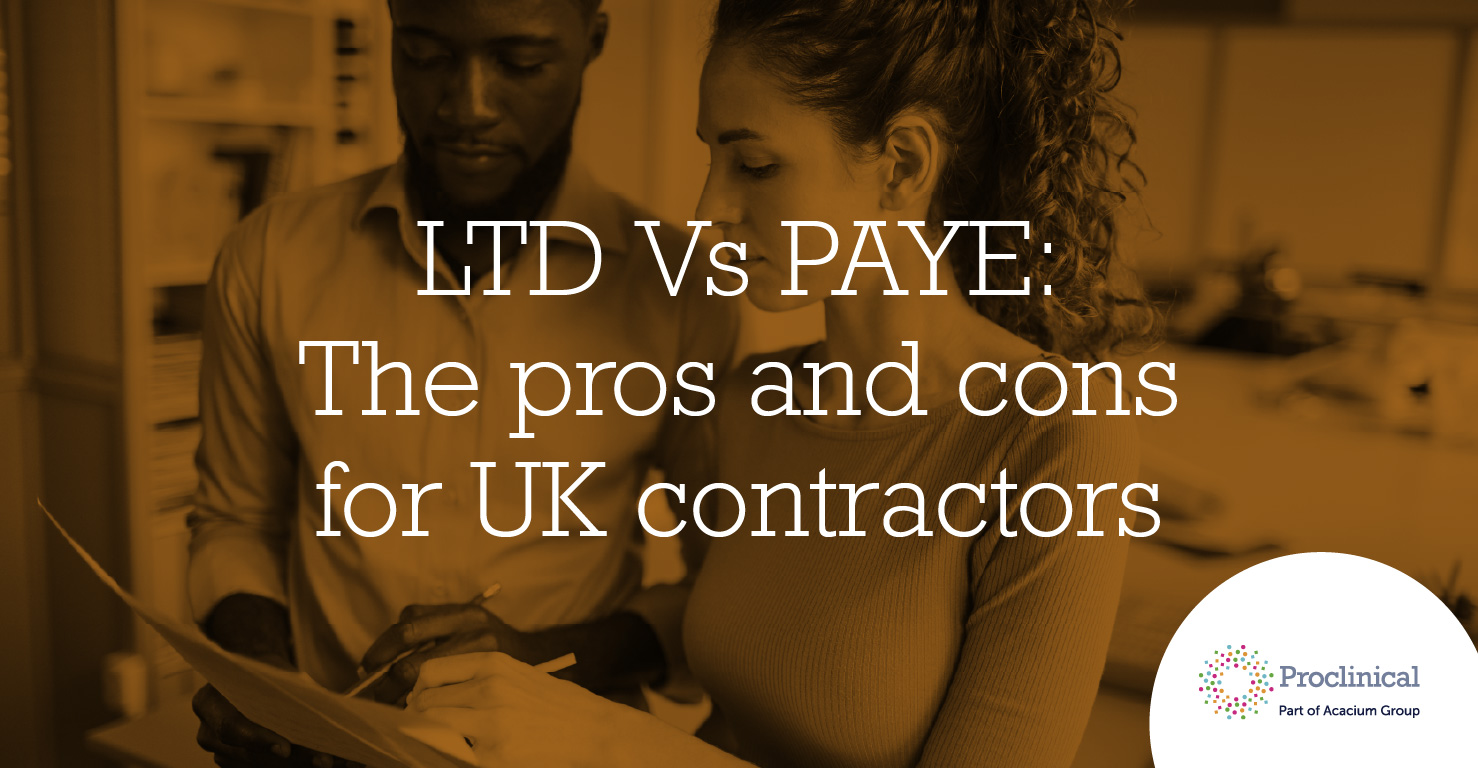
As a recruitment agency that deals in contract jobs, we’re often asked which is better, PAYE or a limited company? Here we weigh up the pros and cons of each to help you decide which is right for you.
Working as a contractor is different from being employed, so before you can take on a contract assignment in the UK, you will need to set up a way to get paid and meet your tax liabilities. Deciding between a limited company or PAYE (pay as you earn) is a question that often comes up when workers are thinking of becoming contractors for the first time or considering switching from one to the other due to a change in circumstances. There are a number of factors to consider, largely based on how much you earn and how much paperwork you are prepared to do, although these are not the only aspects to think about.
Rather than push you in one direction or the other, we’ve put together a list of pros and cons of Ltd vs PAYE in our best effort to remain impartial and only present you with the facts. There is no one-size-fits-all approach so we recommend that you seek independent financial advice tailored to your own individual circumstances to help you make your mind up on what works best for you.
Should you set up a limited company?
Pros of using a limited company
- Total control: As a Director of your own company, you have total control over all transaction and revenue, including the handling of invoicing.
- You decide how you want to be paid: Being self-employed you will pay yourself a salary. If you are on a high tax rate it is possible to leave money in the company account for a period of time so that it can be drawn later at a lower tax rate.
- Credibility and flexibility: Having a limited company with a trading name can enhance your standing when applying for new assignments. It also allows you the flexibility to undertake ad-hoc work for another vendor should you wish to do so.
- Tax exemptions: As a counter to higher rates of personal income tax on your salary, being a director of your limited company will mean you receive dividends, which you do not pay National Insurance on. You can potentially split the company shares between yourself and your partner so you can both use your personal tax allowances and base rate bands. Furthermore, you can register for VAT at a flat rate which may also increase how much you can take home.
- Wider range of expenses: Expenses are not taxed and provided you are outside IR35 legislation, you can claim for a wider range than those inside IR35 or those on PAYE. These include, company formation and accountancy fees, travel and accommodation, phone calls, postage, office equipment, insurance, business entertainment and National Insurance and pension contributions.
Cons of using a limited company
- Managing administrative tasks: Setting up a limited company and related business bank account can take time and require you to complete a fair bit of paperwork. You must also be organised and set yourself reminders to file returns with HMRC and Companies House, including an end of year self-assessment and your P35 and P60 tax forms. You risk being hit with tough penalties if you fail to fulfil these obligations.
- IR35 legislation: This legislation applies to contractors and affects the amount of tax and National Insurance that you will be required to pay. If your contract is inside IR35, you can expect to pay more tax and national insurance and claim for fewer expenses.
- Accountant fees: Limited company accounts are required to be signed-off by a qualified accountant which will incur an annual fixed cost. If you choose to do the administrative side of your books yourself, you must be able to keep an accurate record of your invoicing and VAT.
- Insurance costs: As an independent contractor, you will need to pay for professional liability insurance. This insurance protects the company you provide your services to against any damages or financial loss that you are responsible for, so you won’t get hired anywhere unless you have it.
- International constraints: It is a lot more complicated for limited companies to operate outside of the country of registration, which may mean it isn’t a viable option. You should seek specialist advice if you intend to work on contract assignments abroad through a limited company.
Could PAYE be a better option?
PAYE (pay as you earn) is the standard method by which wages are paid to employees and temporary workers in the UK. Unlike employees who are paid directly by the company they work for, as a contractor you’ll require an intermediary to do this for you – this can either be an agency, such as Proclinical, or an umbrella company. They will effectively be employing you for taxation purposes and therefore be responsible for calculating and deducting income tax, National Insurance, and any other required deductions from your earnings, and ensuring that both you and HMRC receive the correct sums. Whether you are using an agency or an umbrella company, you are effectively hired as their employee and added to their payroll. So, what are the differences between the two?
Using an umbrella company for PAYE
Pros of using Umbrella PAYE
- Non-committal: If you are only planning to interim as a contractor or are not sure that you want to commit to it in the long-term, it may not be worth the investment, financially and administratively, to set up a limited company.
- Easier to manage your finances: You will pay tax as you earn (PAYE) instead of receiving a large bill once a year for your taxes and accountant’s fee, as you would with a limited company.
- Access to benefits: By using an umbrella company you would be eligible for holiday pay and pension. You would also receive statutory sick pay and paternity/maternity pay if and when needed.
- Fully covered: Contractors are typically covered by the employers’ liability, public liability, and professional indemnity insurance, so you don’t need to worry about getting various insurances in place yourself.
- Always available: Not all contract recruitment agencies offer a PAYE solution, so if an agency that doesn’t provide this service has an exclusive assignment that you would like to take, an umbrella company may be your best option.
- Continuity employment: One of the main advantages of using an umbrella company is that you will have a continuous employment record, this can be helpful for securing a loan or applying for a mortgage.
- Business expenses: Employed levels of tax and NI is calculated and paid. However, tax relief is available on any allowable business expenses.
- Relatively admin-free: You will of course be responsible for getting your timesheets signed, but unlike a limited company, invoicing, chasing for payment, compliance with legislation and calculating and managing your tax and National Insurance contributions will be taken care of for you.
Cons of using Umbrella PAYE
- Chain of communication - By using an umbrella company, more parties are involved in setting up contracts and approving timesheets, so there is a greater chance of delays and payments can take longer to reach you.
- Cost: Umbrella companies charge for their services and will deduct their fee from your earnings. The amount that you pay varies from company to company and can depend on what level of service you opt for.
- Lack of control: By using an umbrella company, you are putting faith in them to handle how your invoices are dealt with, as opposed to dealing with them personally as you would in a limited company.
- National Insurance Contributions: If you work as a contractor through PAYE, as opposed to a limited company, you will pay both your own National Insurance contributions and those of the end client.
- Business expenses: Although you are entitled to claim for associated business costs including travel and accommodation and pension contributions, administration expenses are fixed at 5% of your contract income.
- Single vendor contract: If you intend to undertake ad-hoc work for multiple vendors simultaneously, this would require additional contracts under an umbrella company, making it far more difficult and costly than it would be with a limited company.
Using an agency’s PAYE service
Alternative to an umbrella company, there are a number of recruitment agencies, like Proclinical, who could process your income directly as PAYE through their own payroll. This means that you will be effectively employed by them and your salary will be processed by their own payroll as PAYE.
Pros of using agency PAYE
- Single point of contact: Throughout your assignment you will already be in regular contact with your agency, so by using their PAYE option rather than a limited company, there are fewer parties involved, resulting in fewer delays and avoiding additional fees.
- Non-committal: Setting up a limited company requires upfront cost and admin. Agency PAYE gives you the freedom to work on short, interim contracts or change your mind about being a contractor and return to permanent work when your assignment comes to an end.
- Relatively admin-free: Your agency will take care of administrative tasks for you. You will of course be responsible for getting your timesheets signed, but they will take care of invoicing, chasing for payment, compliance with legislation and calculating and managing your tax and National Insurance contributions for you.
- Easier to manage your finances: You will pay tax as you earn (PAYE) instead of receiving a large bill once a year for your taxes and accountant’s fee.
- Employee benefits: Some companies offer full employment rights, such as sickness and holiday pay and maternity leave. In addition, professional liability insurance is usually provided and you are not affected by IR35.
- Working overseas: As PAYE offers flexibility, it can be considered the best option if you are considering relocating abroad for contract jobs.
Cons of using agency PAYE
- Lack of continuity: Whereas an umbrella company offers one tax code to contractors, PAYE agencies do not. This means you each contract would be treated as a separate period of employment, which can sometimes cause problems when applying for loans and mortgages.
- Business expenses: By using an agency, you would be unable to claim for business expenses.
PAYE services can vary from one agency to the next so you always check what they will provide and how this will compare to other agencies and forms of payment. At Proclinical, in addition to the benefits highlighted above, our PAYE service for contract workers offers the following features:
- No cost to the contractor
- A PAYE agency worker employment status
- Eligible for holiday pay and pension provisions
- Access to benefits like statutory sick pay and paternity/maternity pay

.png)

.png)


.png)
.png)




.png)
.png)












